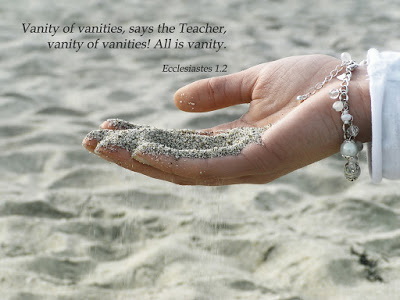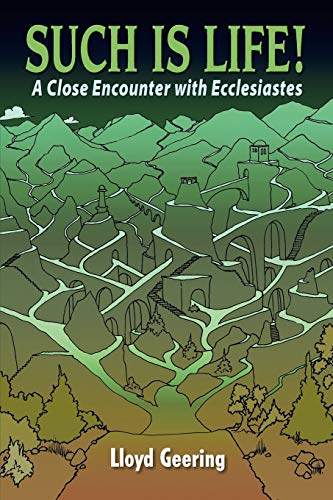I believe the “treasure in heaven” to which Jesus refers is a harvest to be planted and reaped from the dust of earth; with Jesus’ vision of a heaven on earth being the seed to be sown in the field of impermanence.
In the Gospels, Jesus is continually calling on us to discern between what is eternal and what is not. Jesus calls us to let go and be not afraid. He tells us that there is reason to hope in this, even if--or maybe especially if--we hang onto hope by the skin of our calloused fingertips with our last bit of strength. He tell us that what is lasting is not of this world--it is of the Kingdom. All worldly pursuits, all riches, even the emotional "riches" of pride--maybe especially so--come from dust and return to dust. At best they are meaningless, at worst they are distractions that keep us from finding true meaning.
From the Celebrating Mystery collection
Buried in every beginning is an ending.
From the Celebrating Mystery collection
Each day can be a life time. Time is the enemy only if we let it control our lives. Time is redeemed by timeless moments.
From the Celebrating Mystery collection
1. Every apparently static order is but a temporary illusion. 2. The illusion of the order and the reality of the chaos.
P: We have gathered here today to give thanks for and honor Name’s life. You have come because you are family - close family or extended family; or because you are friends – old, long-trusted friends or newer friends; or because you knew Name through other connections in his life. We have gathered to mourn his death and to grieve for our loss.
Written by Rob Stoner, August 2009
I recently conducted the funeral for my father, who died after a long episode of declining health. It was a joy and a privilege to work with my family in preparing this service. But many of our family are not avowedly Christian so I wanted to respect their spiritual traditions as well as be faithful to my own. I also wanted the theology to reflect my own liberal/progressive Christian understanding.
Hebrew Scripture’s View of Life after Death It wasn’t until after the Babylonian Exile that the Pharisees accepted the idea of heaven and
A Commentary for the Annual Observance of Independence Day, 2013
“We hold these truths to be self-evident, that all men are created equal, that they are endowed by their Creator with certain unalienable Rights, that among these are Life, Liberty, and the pursuit of Happiness." These grand words are etched in the American consciousness, and serve as a preamble of sorts to the Constitution’s subsequent ideal goal of “a more perfect union.” With the recent split Supreme Court decisions over voting rights and marriage equality, along with and passage of an immigration reform bill in the Senate that naysayers declare is DOA in the House of Representatives, it would appear that while progress has been made, we clearly remain a work in progress, as well. As we prepare to celebrate our Independence Day holiday this year the fireworks have been set off a little early with the debate over the intelligence surveillance practices of the so-called Patriot Act by a government that was established of, by and for the people. Call them heroes or traitors, whistleblowers or hack-tivists, there are also a growing number of anti-authoritarian tech geeks who claim to be motivated less by notoriety than a certain principled conscience to which they claim to have pledged a higher allegiance. So, what is the nature of “natural” or “divinely-bestowed” rights? What of human conscience, earthly authority, and more? And – for those of us who might consider ourselves both a red-blooded American and Christian of one sort or other -- what might constitute a “Christian” conscience, based on a Jesus life-ethic? You can find the latest commentary Here.
2) The Hebrew scriptures, or the Old Testament, represent a religious tradition that is independent of the later Christian faith. The Hebrew scriptures aren't about Jesus, although the Christian scriptures include many references to the Hebrew scriptures. To honor the fundamental differences between the two sets of scriptures doubles the spiritual significance of the entire Bible.
Though some twenty three centuries have passed since an anonymous Jewish sage calling himself the Proclaimer (Ecclesiastes) set down his thoughts about life, they are strangely in tune with todays secular age. Its surprising, therefore, that they ever found a place in Holy Scripture. Lloyd Geering has brought Ecclesiastes to life by ingeniously composing imaginative dialogues with the sage, which show that he was a free thinker, a humanist, and an existentialist. In fact, this biblical heretic essentially undermined the rest of the Hebrew Bible by finding no discernible thread of purpose in the universe or in human existence, and by proposing that though Nature operates in ever-repeating cycles, much of human life is determined by sheer chance. The role of the sage, as Ecclesiastes saw it, was not to pass on gems of eternal wisdom, but to goad us into thinking things out for ourselves in our search for meaning in life.


















